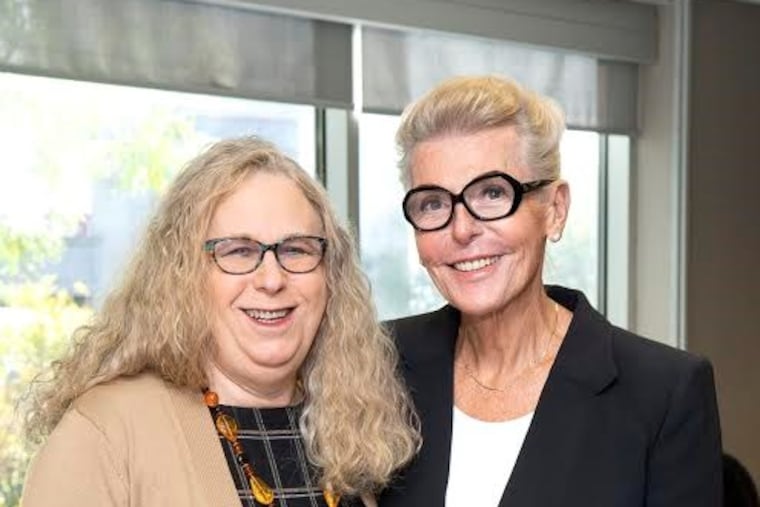How Philly should lead on transgender health care | Opinion
If Philadelphia wants to remain a top transgender healthcare provider in the country, academic medical centers need to continue listening to transgender healthcare professionals.

Across the country, academic medical centers are paying close attention to transgender medicine and how to treat transgender patients. Between Philadelphia College of Osteopathic Medicine’s (PCOM) extensive educational training and outreach on transgender health-care issues and Drexel’s Hahnemann University Hospital’s Transgender Fellowship Training Program, a rare program focused on medical and surgical care for transgender patients, Philadelphia is one of the leading providers in transgender health.
PCOM’s innovative medical curriculum highlights the needs of transgender patients to better prepare the school’s physician and physician assistant students to address LGBTQ health issues. This includes a variety of programming, from an annual transgender medicine symposium to transgender medicine lecture series and a required interactive course for second-year students to learn more about unique health disparities facing the transgender community. From psychiatry to plastic surgery, students from all academic backgrounds are given information on how to support transgender patients — using their correct names and pronouns — and the medical needs they may have while transitioning and taking hormones.
With Hahnemann announcing its closure last week and filing for bankruptcy, there* will be no transgender fellowship 2019 to 2020. But the fellowship is set to move to Jefferson University Hospital in 2020, as Philadelphia Gay News reported Monday. It’s important that the fellowship live on for a community that deserves better care.
Historically, many LGBTQ individuals have faced obstacles in receiving adequate care. In a 2010 survey conducted by Lambda Legal, almost 56 percent of lesbian, gay, or bisexual (LGB) respondents had one or more discriminatory care experiences, and 70 percent of transgender and gender-nonconforming respondents had one or more of these experiences.
Additionally, a 2017 study by JAMA Internal Medicine discovered a large discrepancy between how doctors perceived asking patients about being LGBTQ, and how patients themselves responded to such questions. Whereas just 10 percent of patients claimed they would refuse to answer questions about their sexual identity, nearly 80 percent of emergency department health-care providers believed that patients would refuse to answer.
While not every student at PCOM will specialize in treating LGBTQ patients, each will leave with a better understanding of specific health issues many of the individuals in this community face.
Dr. Anne Koch, a health care professional who received both her DMD and Certificate in Endodontics from the University of Pennsylvania and began to medically transition when she was 63, says that PCOM has done a great job bringing these issues to the forefront through their training of future surgeons.
“Transgender health care is an education issue,” says Koch. “A key for providers is to create a welcoming environment for transgender patients. Patients need to feel safe and knowledgeable throughout the entire transition process. The emotional aspect of a gender transition is far more challenging than the physical issues. Surgeons in the Philadelphia area are doing a stellar job at informing their patients about this."
Philadelphia’s edge in transgender health care is not only a result of academic medical centers educating those in the field, but by allowing transgender people a leading space in the discussion.
“When striving to improve provider acceptance of transgender patients, medical schools need to bring in health-care providers who have transitioned,” adds Koch. “We need people who have experienced both being transgender and giving surgery.”
Along with Koch, Dr. Christine McGinn, who runs her own practice in New Hope,and Dr. Rachel Levine, secretary of health for the Commonwealth of Pennsylvania, transgender people are at the forefront of transforming transgender health care in the Philadelphia area.
When health-care providers understand the trials and tribulations transgender people face in order to receive adequate care, the health-care system can better treat their patients, acknowledging why some transgender people are at greater risks of health issues, like cancer.
While educational training on transgender issues is a great start, practitioners are often left in the dark with the lack of research on the long-term health-care needs of transgender people following gender reassignment and other surgeries. As a result, there are insufficient regulations when it comes to ensuring safety and success for transgender surgeries.
“We need more evidence-based results and we need to apply the same critical eye that we see in other medical disciplines in order to make transgender health care better,” Koch says. “In endodontics, a satisfactory success rate is between 96-97 percent and a 90 percent success rate is considered a failure. For transgender patients, a 75 percent success rate is not acceptable; we need to stop accepting that.”
Going forward, if Philadelphia wants to remain a top transgender health-care provider in the country, academic medical centers need to continue listening to transgender health-care professionals in the larger discussion of transgender health issues and commit to producing data to substantially raise patients’ quality of life.
Nick Fiorellini is a freelance writer from the Philadelphia area.
*Editor’s note: This post has been updated to reflect the continuation of the Transgender Fellowship Training Program, as reported by PGN.